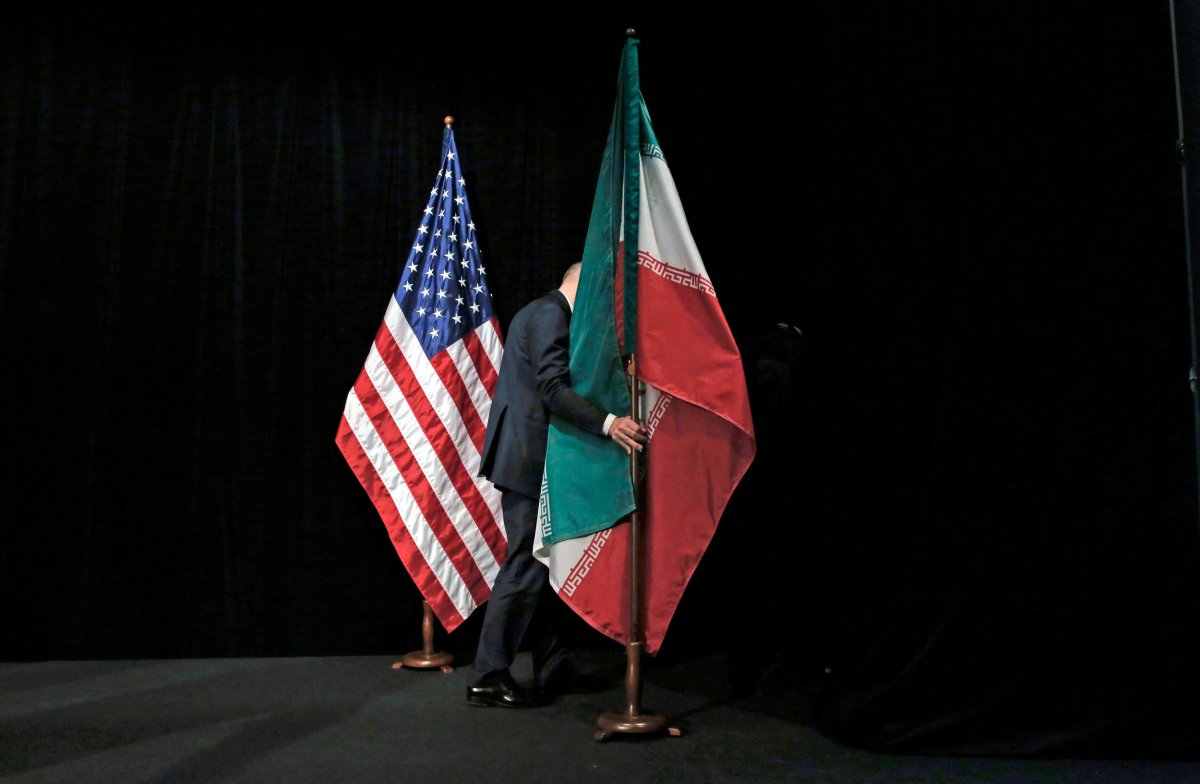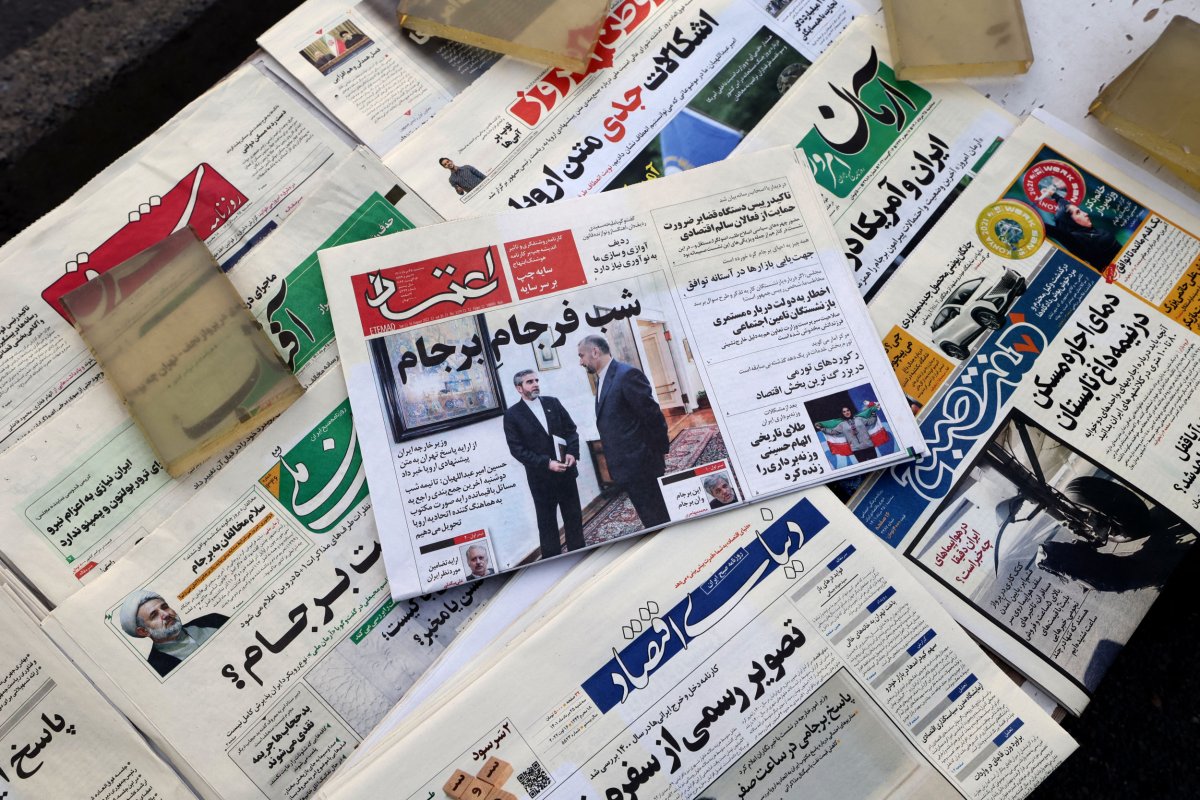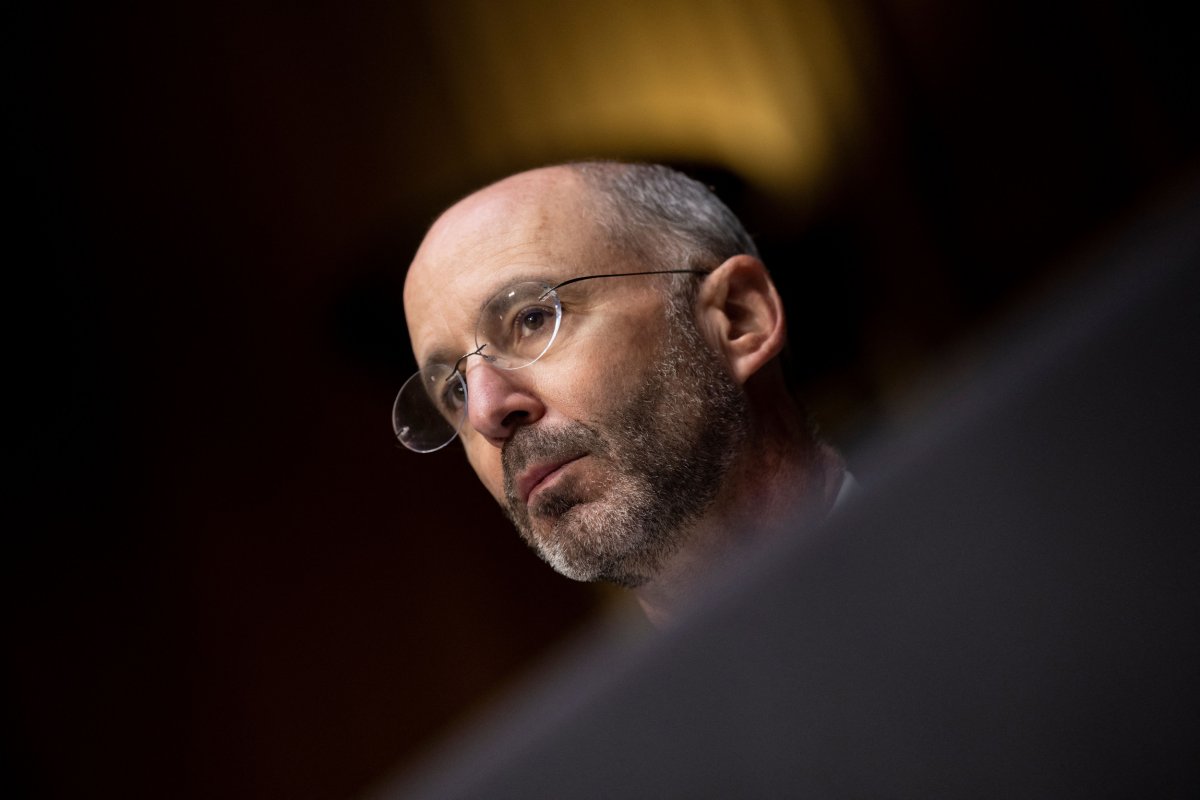With the ball once again in the U.S. court to evaluate Iran's final recommendations on reviving their 2015 nuclear agreement with major world powers, the stakes are higher for both sides than at any point since President Joe Biden set out nearly a year and a half ago to undo his predecessor's exit from the landmark accord.
As the clock ticks toward the 11th hour, with the fate of the deal officially known as the Joint Comprehensive Plan of Action (JCPOA) hanging in the balance, Newsweek has spoken with key former officials and advisers regarding their perspectives on where the U.S. and Iran stand, and how a positive or negative outcome could affect them.
"Iran and the U.S. are engaged in what seem like good faith negotiations to restore the JCPOA once and for all," Ellie Geranmayeh, senior policy fellow and deputy head of the Middle East and North Africa program at the European Council on Foreign Relations, told Newsweek.
"The two sides are closer than ever in closing the gaps that remain," she added. "But they need to do so very quickly to utilize the current diplomatic momentum that favors the revival of the nuclear deal."
Geranmayeh advised European governments and companies on the nuclear negotiations between Iran and fellow JCPOA signatories China, France, Germany, Russia, the United Kingdom and the U.S. in the leadup to the original deal, and has continued to brief senior policymakers on how to safeguard the implementation of the agreement.
Today, she has identified one of the most serious concerns Iran has about reentering the deal — U.S. politics.
"A major sticking point in Tehran is that there is an acknowledgment that the EU and Biden administration cannot block a future U.S. government from withdrawing from the deal again like Trump," Geranmayeh said. "Iran is now focused on obtaining last-minute technical and political concessions from the U.S. that would act as an insurance policy to raise the costs to the U.S. if it withdrew from the deal."
But time is running out, especially in the West, as the latest developments mark a glimmer of optimism in what has become an increasingly dim picture.
"There is very little bandwidth in Washington and European capitals to drag out these negotiations beyond the summer," Geranmayeh said. "If in the coming days we cannot reach a compromise between Tehran and Washington, I think we will see a shift in the Western position towards contingency plans and more coercive measures."

While the JCPOA has remained alive in name, the U.S. exit prompted a wave of unilateral sanctions that have largely cut off trade with Western countries, which have feared triggering economic punishment from Washington. Although Biden, who served as vice president to then-President Barack Obama when the deal was reached, has branded Trump's withdrawal a "gigantic mistake," he has maintained sanctions against the Islamic Republic, and even added additional ones in the absence of a negotiated U.S. return to the agreement.
In response to being deprived of economic benefits promised in exchange for curbing its nuclear program, Iran has gradually ramped up nuclear activities, even as Iranian officials repeatedly denied they intended to produce a weapon of mass destruction.
Tensions between Washington and Tehran have also increased significantly across the Persian Gulf region in the wake of the U.S. pullout of the JCPOA. While the two historic foes have been at geopolitical odds since the 1979 Islamic Revolution that displaced a U.S.-backed monarch, their feud has turned deadly in the form of an ongoing series of rocket attacks by "Axis of Resistance" militias against U.S. personnel in Iraq and Syria and, perhaps most notably, the U.S. killing of Iran's Revolutionary Guard Quds Force commander Major General Qassem Soleimani in January 2020.
Despite the continued bad blood, however, both sides still appear to see the value in rekindling the diplomatic milestone that was the JCPOA.
"The basic outline of the deal is still what it has been for more than a year: compliance for sanctions relief," John Erath, a 30-year State Department veteran now serving as senior policy director at the Center for Arms Control and Non-Proliferation, told Newsweek. "It is clearly in the best interests of all sides to resume the JCPOA and not allow other political considerations to stand in the way."
From the U.S. perspective, Erath argued that "the benefits to returning to compliance are the resumption of verifiable limits in Iran's nuclear program that would block pathways to building nuclear weapons."
He also pointed out that among the most critical aspects of the JCPOA was the "verification/information regime which allows international monitors unprecedented access to Iranian facilities." This served to alert the International Atomic Energy Organization (IAEA) if Iran attempted to cheat on the limits of the deal.
As Tehran sought to push back on a proposed IAEA probe into alleged traces of nuclear material found at certain sites in Iran in recent years, he argued that prolonged oversight from the U.N.'s nuclear watchdog was vital. Without a follow-up process to ensure this, he said that "the JCPOA only serves as a pause" for Iran's nuclear activities.
"It will be therefore necessary to begin negotiation of how to manage this risk soon," Erath said. "If the JCPOA is treated as an end in itself, instead of a step on the path to a verifiably non-nuclear Iran, it risks returning to a crisis situation on its expiration. The agreement would, if resumed, however, provide needed space for negotiations, so the world would be better with it than without."
Rose Gottemoeller, a former NATO Deputy Secretary General and U.S. Under Secretary of State for Arms Control and International Security, now working as a lecturer at Stanford University's Freeman Spogli Institute for International Studies and its Center for International Security and Cooperation, said the benefits of the JCPOA for the U.S. would be that "Iran will be moved farther away from acquiring enough fissile material to make a nuclear bomb — from the current few weeks to at least a few months."
And she told Newsweek of "an important added benefit," in that "Iran's oil will flow again, relieving tight energy markets constricted after Russia's invasion of Ukraine."
Even with these incentives in mind, trust remains low in both Washington and Tehran, as domestic skepticism emerged toward the agreement once hailed across much of the globe. Lawmakers in both capitals have called for a more active role in ensuring the deal meets their respective national interests.
"Both the U.S. and Iran have political issues to confront, enemies of the deal in both Washington and Tehran," Gottemoeller said. "Both of them are going to have to do some heavy lifting."
The way forward envisioned by Gottemoeller would be that Iran allows "restoration of IAEA procedures to ensure their compliance with the deal," which "in turn will create space for the Biden administration to make the case that a revived JCPOA is good for U.S. security and the security of our allies and partners, in the region and beyond."

For Iran, the deficit of faith in the U.S. system is particularly pronounced, given that it was the U.S. that abandoned the deal in the first place. A number of influential U.S. conservatives, including lawmakers, have already vowed to work toward tearing up the JCPOA once again if a Republican is elected president in 2024.
"Iran wants a sustainable JCPOA, and that's why it is insisting on a credible guarantee that the U.S. will not break the promise again," said Seyed Hossein Mousavian, who previously served in a number of Iranian government positions including as foreign policy adviser to the secretary of the Supreme National Security Council and as a negotiator in Iran's first round of nuclear talks with the international community nearly two decades ago.
"Iran needs to be sure about all economic benefits if the JCPOA is revived," he told Newsweek.
Now a Middle East security and nuclear policy specialist at Princeton University's Program on Science and Global Security, Mousavian said assurances toward the longevity of the deal were especially important, "because the current U.S. Congress, with a majority of Democrats, in addition to the Biden administration, have both imposed many new sanctions on Iran on top of those 1,500 that Trump imposed."
A number of these sanctions do not directly address nuclear concerns, but rather other areas of contention in the U.S.-Iran rivalry.
"If the U.S. Congress and the Biden administration will continue to impose sanctions on Iran under the guise of missiles, drones, terrorism and human rights issues," he added, "it would render the JCPOA practically dysfunctional and undermine Iran's full economic benefits."
With little time or space left to maneuver on the issue, there does not appear to be any mechanism available other than the JCPOA to defuse nuclear-related tensions between the two sides.
Speaking to reporters on Tuesday, State Department spokesperson Ned Price called the JCPOA the "best alternative to the status quo and certainly to the specter of an Iranian nuclear weapon." He said there was "an open invitation for anyone who thinks that there is a better approach to offer," but none had answered.
Asked about a "Plan B" — a term often used to insinuate a military option — Price said "it's something that we've discussed with our allies and partners to a great extent," and "absolutely will resort to" in the event that "the JCPOA proves not to be viable, if we get to a point where the deal that is on the table is not in our national security interests."
The day before, Iranian Foreign Minister Hossein Amir-Abdollahian told reporters that "like Washington, we have our own plan B if the talks fail," amidst the Biden administration echoing Trump-era language of "all options" being on the table.
But Mousavian rejected this scenario, given Iran's initial compliance with the JCPOA and its membership to the Nuclear Non-proliferation Treaty (NPT), which is currently undergoing its 10th Review Conference in New York.
"A military strike is not a realistic option," he said. "Iran fully complied with the JCPOA and the U.S. cheated. Therefore, the U.S. is responsible for the current situation, and not Iran. Even in the absence of JCPOA, Iran will remain a member of NPT. A nuclear weapon state member of the NPT should never attack a non-nuclear weapon state that is a member of the NPT."
"If attacked, Iran will withdraw from NPT and master the nuclear bomb," he added. "The U.S. and Iran should deescalate the tensions. Among all the crises in the Middle East, the Iran nuclear crisis is the only one resolved through diplomacy. This is an asset and could be a model to resolve other disputed issues."

Hossein Malaek, a former Iranian diplomat who served as ambassador to Switzerland and China, also dismissed outright the prospect of a military conflict, saying talk of war "is off the table."
With Tehran's reply to the final draft circulated by the EU now in the hands of the U.S., Malaek said that "it appears that the Iranian side has the upper hand" in the trajectory of the talks, and that the current version was probably the best that Washington could expect.
"This is for the first time that Iran has proposed something that the U.S. should think about," Malaek said. "This is very new and shows that time is short, the window is closing, there are deadlines, and, above all, Plan B is nonsense, and the new Iranian negotiators did not take any of these threats seriously, which is good."
He argued that it would be impossible for the U.S. to get the JCPOA it initially wanted walking into the new talks, because "many things have changed technically and politically" over the past seven years, and today, "even the U.S. can not make any coalition against Iran with the Europeans."
France, Germany and the U.K. were deeply opposed to Trump's decision to walk away from the deal in 2018 and, though the European trio has continued to express concerns about Iranian activities in various spheres, they have also voiced frustration toward the lack of an agreement.
Facing an "uphill battle" even with allies, U.S. officials "have to prepare for a 'big' concession if they want the deal," Malaek argued, noting that this is something that "seems rather difficult at this moment."
Now all eyes are on Washington, as the world awaits its answer to Iran's response to the JCPOA draft text.
Gary Samore, who was responsible for the nonproliferation of weapons of mass destruction in top White House National Security Council positions under Obama and former President Bill Clinton, outlined what may come next.
"My impression is that the Biden administration is likely to make a counter proposal to the Iranian response to the EU 'final' text, which will accept some elements of the Iranian response and propose to modify others," Samore told Newsweek. "The gap between the U.S. and Iran seems to be narrowing, but the negotiations will continue because neither side wants to give up."
Samore, who today is a professor of the practice of politics and Crown Family Director of the Crown Center for Middle East Studies at Brandeis University, also compared the two positions the two nations were facing at this consequential moment. In both Washington and Tehran, he argued that the best path forward lies through the JCPOA, uncomfortable as it may be for the two nations.
"From the U.S. standpoint, reviving the JCPOA remains the most effective means to limit Iran's nuclear program for the near term (until 2030) without the risks and uncertainties of using military force," Samore said. "From Iran's standpoint, reviving the JCPOA is the most effective way to obtain relief from the most significant sanctions on Iran's oil exports and access to revenue from oil sales."
"Of course, Iran would like additional sanctions relief (such as lifting terrorism sanctions on the IRGC)," he added. "But I think Iran has accepted that the U.S. is not prepared to do that without progress on non-nuclear issues, such as Iran's activities in the region."
Uncommon Knowledge
Newsweek is committed to challenging conventional wisdom and finding connections in the search for common ground.
Newsweek is committed to challenging conventional wisdom and finding connections in the search for common ground.
About the writer
Based in his hometown of Staten Island, New York City, Tom O'Connor is an award-winning Senior Writer of Foreign Policy ... Read more
To read how Newsweek uses AI as a newsroom tool, Click here.








